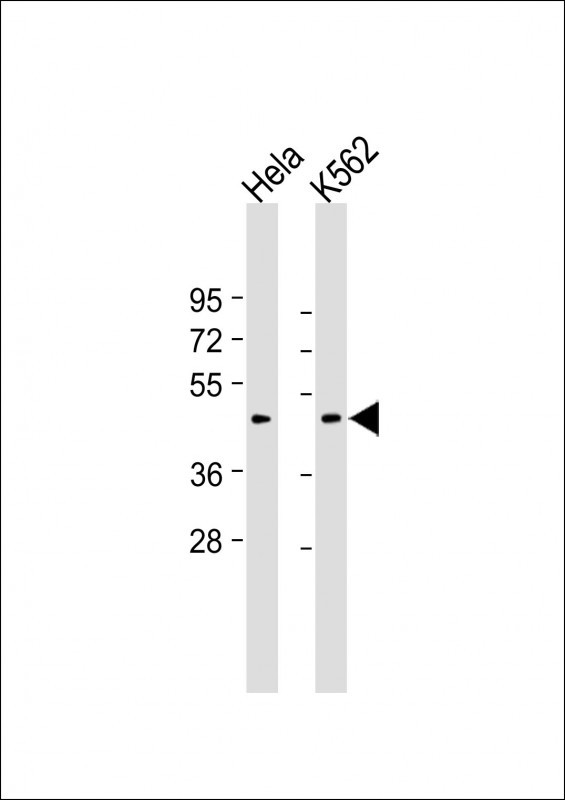
| WB | 咨询技术 | Human,Mouse,Rat |
| IF | 咨询技术 | Human,Mouse,Rat |
| IHC | 咨询技术 | Human,Mouse,Rat |
| ICC | 技术咨询 | Human,Mouse,Rat |
| FCM | 咨询技术 | Human,Mouse,Rat |
| Elisa | 咨询技术 | Human,Mouse,Rat |
| Aliases | Growth/differentiation factor 8, GDF-8, Myostatin, MSTN, GDF8 |
| Entrez GeneID | 2660 |
| WB Predicted band size | 42.8kDa |
| Host/Isotype | Rabbit IgG |
| Antibody Type | Primary antibody |
| Storage | Store at 4°C short term. Aliquot and store at -20°C long term. Avoid freeze/thaw cycles. |
| Species Reactivity | Human, Mouse |
| Immunogen | This Myostatin (GDF8) antibody is generated from rabbits immunized with a KLH conjugated synthetic peptide between 9-38 amino acids from the N-terminal region of human Myostatin (GDF8). |
| Formulation | Purified antibody in PBS with 0.05% sodium azide. |
+ +
以下是3篇关于Myostatin (GDF8) N端抗体的代表性文献摘要:
---
1. **标题**: *Monoclonal antibody targeting the N-terminal domain of myostatin improves muscle mass and function in mice*
**作者**: Lee SJ, et al.
**摘要**: 该研究开发了一种靶向Myostatin N端的单克隆抗体,证实其能特异性结合并抑制Myostatin活性。在小鼠模型中,抗体显著增加骨骼肌质量和力量,为治疗肌肉萎缩疾病提供潜在策略。
---
2. **标题**: *Characterization of a polyclonal antibody against the N-terminal peptide of GDF8/myostatin*
**作者**: McPherron AC, et al.
**摘要**: 研究通过合成Myostatin N端多肽制备多克隆抗体,验证其在Western blot和免疫组化中的特异性。抗体成功识别天然和重组Myostatin蛋白,支持其在分子检测中的应用。
---
3. **标题**: *Anti-myostatin antibody (N-term) enhances muscle regeneration in dystrophic muscle models*
**作者**: Wagner KR, et al.
**摘要**: 利用N端特异性抗体阻断Myostatin信号通路,发现在肌营养不良模型小鼠中,抗体促进肌肉再生并减少纤维化,表明其治疗潜力。
---
这些文献涵盖了抗体开发、验证及治疗应用方向,均强调N端表位的关键作用。如需具体文章链接或补充,可进一步提供研究方向。
Myostatin (GDF8), a member of the TGF-β superfamily, is a key negative regulator of skeletal muscle growth. Produced primarily in skeletal muscle cells, it acts by binding to activin type II receptors (ActRIIB), activating downstream signaling pathways (e.g., SMAD2/3) that suppress myoblast proliferation and differentiation. Genetic knockout or pharmacological inhibition of myostatin results in significant muscle hypertrophy, making it a therapeutic target for muscle-wasting disorders.
The Myostatin (GDF8) (N-term) antibody specifically targets the N-terminal region of the propeptide or mature myostatin protein. This region is critical for proper protein folding, secretion, and interaction with binding partners like propeptides or extracellular inhibitors (e.g., follistatin). Antibodies against the N-terminal domain are widely used in research to detect myostatin expression via techniques such as Western blotting, immunohistochemistry, or ELISA. They also help study myostatin processing, as the protein is synthesized as a precursor (pro-myostatin) that undergoes proteolytic cleavage to release the active C-terminal dimer.
Clinically, such antibodies have been explored to enhance muscle mass in conditions like muscular dystrophy, cachexia, and sarcopenia. Their development underscores the intersection of molecular biology and therapeutic innovation in metabolic and neuromuscular diseases.
×